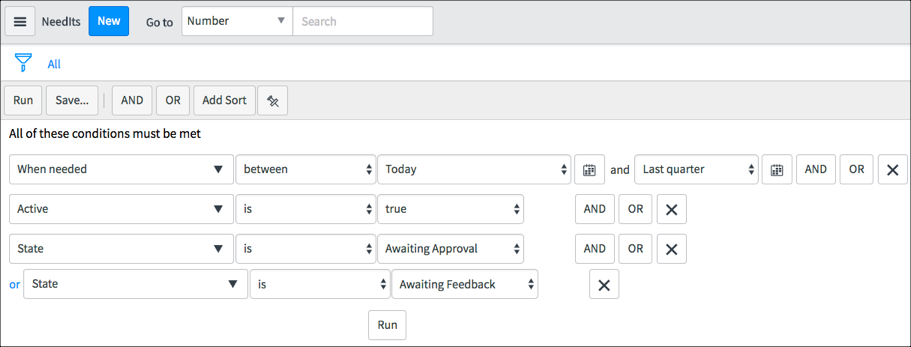GlideRecord
The GlideRecord class is the way to interact with the ServiceNow database from a script. See the GlideRecord API reference for a complete list of methods.
GlideRecord interactions start with a database query. The generalized strategy is:
Here is what the generalized strategy looks like in pseudo-code:
// 1. Create an object to store rows from a table
var myObj = new GlideRecord('table_name');
// 2. Build query
myObj.addQuery('field_name','operator','value');
myObj.addQuery('field_name','operator','value');
// 3. Execute query
myObj.query();
// 4. Process returned records
while(myObj.next()){
//Logic you want to execute.
//Use myObj.field_name to reference record fields
}NOTE: The GlideRecord API discussed here is a server-side API. There is a client-side GlideRecord API for global applications. The client-side GlideRecord API cannot be used in scoped applications.
Build the Query Condition(s)
Use the addQuery() method to add query conditions. The addQuery operators are:
The addQuery() method is typically passed three
arguments: field name, operator, and value. In some scripts you will
see only two arguments: field name and value. When the addQuery() method
is used without an operator, the operation is assumed to be =.
When there are multiple queries, each additional clause is treated as an AND.
Queries with no query conditions return all records from a table.
If a malformed query executes in runtime, all
records from the table are returned. For more strict query control you
can enable the glide.invalid_query.returns_no_rows property which
returns no records for invalid queries.
Iterating through Returned Records
There are several strategies for iterating through returned records.
The next() method and a while loop iterates through all returned records to process script logic:
// iterate through all records in the GlideRecord and set the Priority field value to 4 (low priority).
// update the record in the database
while(myObj.next()){
myObj.priority = 4;
myObj.update();
}
The next() method and an if processes only the first record returned.
// Set the Priority field value to 4 (low priority) for the first record in the GlideRecord
// update the record in the database
if(myObj.next()){
myObj.priority = 4;
myObj.update();
}
You can also use the updateMultiple() method to
update all records in a GlideRecord. If you use the updateMultiple()
method you MUST set field values using the setValue() method.
// When using updateMultiple() use the setValue() method. If you do myObj.priority = 4, ALL
// records in the table will be updated and not just the GlideRecord records.
myObj.setValue('priority',4);
myObj.updateMultiple();Counting Records in a GlideRecord
The GlideRecord API has a method for counting
the number of records returned by a query: getRowCount(). Do not use the
getRowCount() method on a production instance as there could be a
negative performance impact on the database. If you need to know the
number of rows returned by a query on a production instance, use a
GlideAggregate.
// If you need to know the row count for a query on a production instance do this
var count = new GlideAggregate('x_snc_needit_needit');
count.addAggregate('COUNT');
count.query();
var recs = 0;
if (count.next()){
recs = count.getAggregate('COUNT');
}
gs.info("Returned number of rows = " +recs);
// Don't do this on a production instance.
var myObj = new GlideRecord('x_snc_needit_needit');
myObj.query();
gs.info("Returned record count = " + myObj.getRowCount());Encoded Queries
As already discussed, if there are multiple
conditions in query, the conditions are ANDed. If you want to use ORs or
if you have a technically complex query, use encoded queries. The code
for using an encoded query looks like this:
var myObj = new GlideRecord("x_snc_needit_needit");
myObj.addEncodedQuery('<your_encoded_query>');
myObj.query();
while(myObj.next()){
// Logic you want to execute for the GlideRecord records
}
The trick to making this work is to know the
encoded query syntax. The syntax is not documented so the best thing to
do is let ServiceNow build the encoded query for you. In the main
ServiceNow browser window, use the Application Navigator to open the
list for the table of interest. If there is no module to open the list,
type <table_name>.list in the filter field in the Application
Navigator.
Use the Filter to build the query condition.

Click the Run button to execute the query.
Right-click the breadcrumbs and select Copy query. Where you click in
the breadcrumbs matters. The copied query includes the condition you
right-click on and all conditions to the left. To copy the entire query,
right-click on the condition farthest to the right.

Return to the script and paste the encoded
query into the addEncodedQuery() method. Be sure to enclose the encoded
query in "" or ’’.
var myObj = new GlideRecord("x_snc_needit_needit");
myObj.addEncodedQuery("u_when_neededBETWEENjavascript:gs.daysAgoStart(0)@javascript:gs.quartersAgoEnd(1)^active=true^state=14^ORstate=16");
myObj.query();
while(myObj.next()){
// Logic you want to execute for the GlideRecord records
}